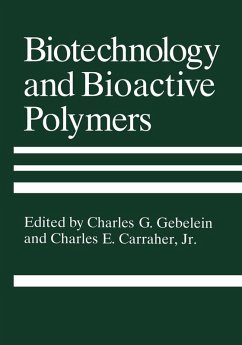Some have predicted that the coming several decades will be the decades of "biotechnology," wherein cancer, birth defects, life span increases, cosmetics, biodegradation, oil spills and exploration, solid waste disposal, and almost every aspect of our material life will be affected by this new area of science. There will also be an extension of emphasis on giant molecules: DNA, enzymes, polysaccharides, lignins, proteins, hemoglobin, and many others. Biotechnology has been defined in various ways. In one sense, this field is older than human history and references to the human use of biotechnology-derived materials can be found in the oldest human writings, such as the Bible. In this book, biotechnology refers to the direct usage of naturally occurring materials or their uses as a feedstock, including the associated biological activities and applications of these materials. Bioactive polymers, on the other hand, are polymers which exert some type of activity on living organisms. These polymers are used in agriculture, controlled release systems, medicine and many other areas. The papers in this book describe polymers which essentially combine features of biotechnology and bioactivity.
Dieser Download kann aus rechtlichen Gründen nur mit Rechnungsadresse in A, B, BG, CY, CZ, D, DK, EW, E, FIN, F, GR, HR, H, IRL, I, LT, L, LR, M, NL, PL, P, R, S, SLO, SK ausgeliefert werden.
Hinweis: Dieser Artikel kann nur an eine deutsche Lieferadresse ausgeliefert werden.









